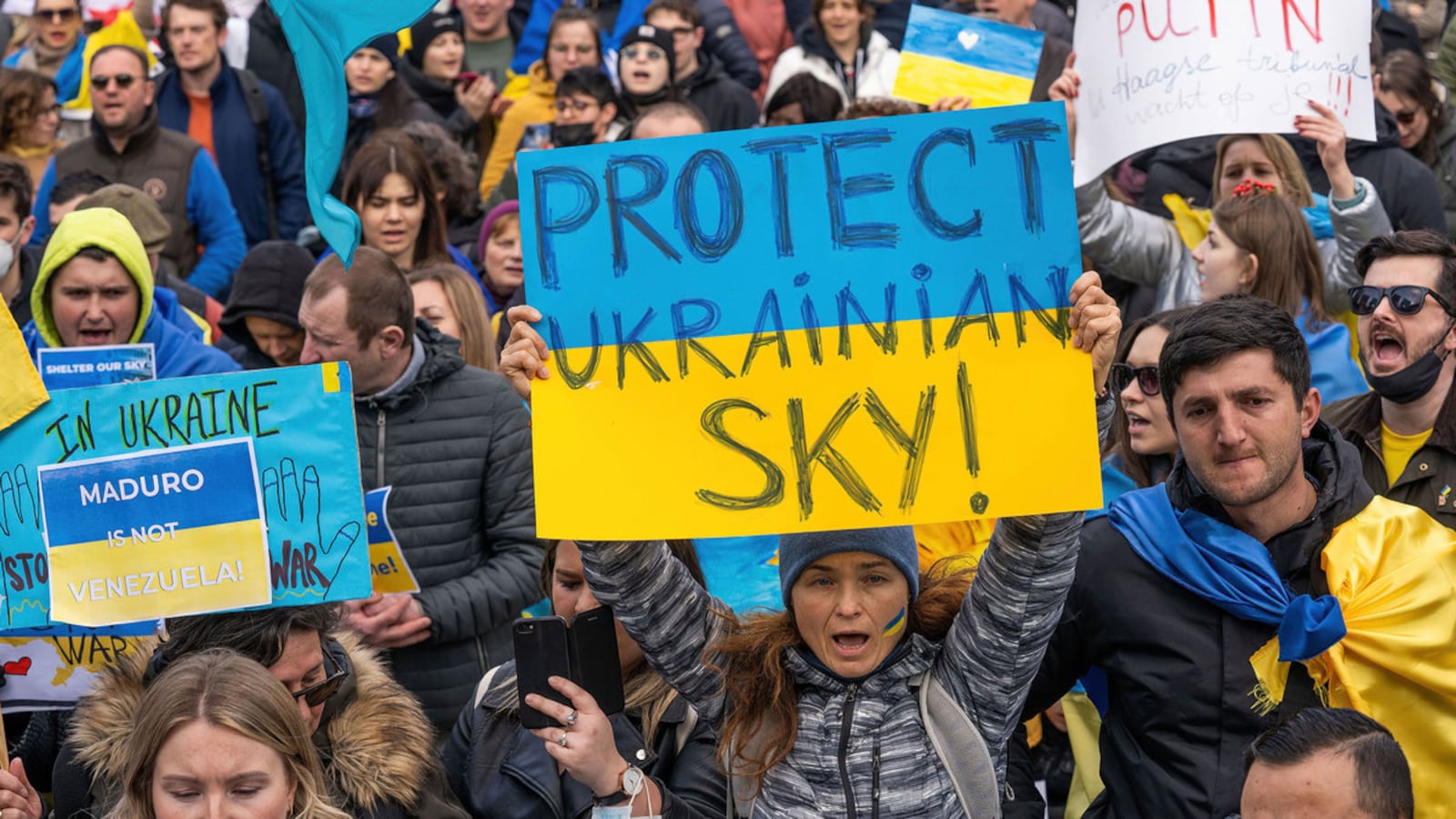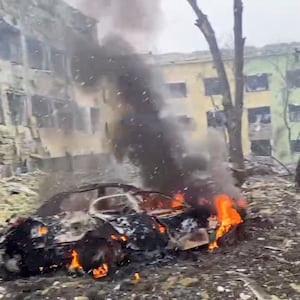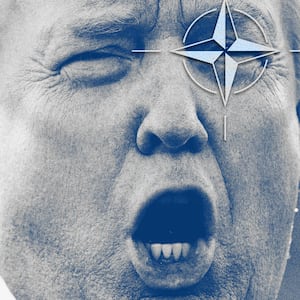Enough is enough. It is well past time for the U.S., NATO, and Europe to draw a red line in the sand with Vladimir Putin, and demand he end his war of attrition in Ukraine by coupling sanctions with the threat of force.
NATO should immediately announce a 72-hour ultimatum—using the threat of a no-fly zone over Ukraine as leverage—to demand an immediate cease-fire and the beginnings of a complete Russian withdrawal from Ukraine.
If Putin fails to meet these terms, then a NATO-led no-fly zone over Ukraine—at the express invitation of the Ukrainian government—will go into effect. In the intervening 72 hours between the announcement and deadline, Ukrainian officials would be in a position of strength in cease-fire negotiations with the backing of NATO’s air power overshadowing the talks.
As Ukrainian President Volodymyr Zelensky said on March 16 in his address to the U.S. Congress, Ukrainian armed forces can fight Russian ground troops on their own, but to survive as a country, they need NATO to close Ukrainian skies to Russian bombers.
Under the current circumstances, Ukraine’s request is eminently reasonable. The creation of a no-fly zone would serve two purposes vital to the West’s strategic interests. It would preserve the territorial integrity of Ukraine and prevent the expansion of Russia to the Polish border—the land bridge to central and Western Europe.
Sanctions, no matter how severe, will not stop the advance of Russian tanks, something President Joe Biden acknowledged before the war began. Nor will sanctions put an end to Russia’s outrageous aerial bombardments of Ukrainian cities, orphanages, kindergartens, hospitals, universities, apartment buildings, theaters, and humanitarian corridors.
A catastrophe of historic proportions is unfolding before our eyes, with Russia embarking on a barbaric siege-and-starvation tactic in the southeastern Ukrainian city of Mariupol, where 400,000 civilians are trapped without food, water, heat or medical care.
A Mariupol city official ominously said on March 11, “Humanity has not yet invented a word for what Russia is doing to us.” Putin is also deploying the same tactic in Kharkiv, Chernihiv, Sumy, and in Kyiv—slowly encircling Ukraine’s capital. “This is a premeditated and unprovoked aggression built on a body of lies and false narratives,” CIA director William Burns said March 10 on Capitol Hill.
As of March 16, the UN estimates 780 Ukrainian civilians have died, over 1,250 have been injured, 24 medical facilities have been bombed, and 3.2 million Ukrainian refugees have fled to neighboring countries.
And just today, Russia launched rockets at the "safe haven" city of Lviv in Western Ukraine.
In the wake of the largest land invasion of a European country since World War II, President Biden, NATO Secretary General Jens Stoltenberg, and European Commission President Ursula von der Leyen rigidly adhere to the policy they announced before the invasion: All possible assistance short of military intervention would be provided to Ukraine.
The problem is, the only form of aid that today would halt Russia’s day-in, day-out slaughter of Ukrainian civilians is military intervention.
“Throughout our history,” President Biden said at his recent State of the Union address, “we’ve learned this lesson: when dictators do not pay a price for their aggression, they cause more chaos.”
And so I ask: Has the West really learned that lesson? Has the price exacted on Putin diminished the chaos the war is creating in Ukraine, Europe, and the world? Because the answer is an obvious “No,” the only conclusion we can draw is that the West must up its game to end the chaos brought on by Vladimir Putin’s war of choice.
The NATO position against military intervention continues unabated without regard to the dramatic deterioration of the situation in Ukraine and for refugees. When a reporter asked Secretary Stoltenberg at a press conference on March 5 to respond to Ukrainian President Volodymyr Zelensky’s impassioned plea for a NATO no-fly zone to prevent Russia’s indiscriminate bombing of Ukrainian cities, Mr. Stoltenberg replied, “We understand Ukraine’s desperation. But we also believe that if we did that, then it would end in a full-fledged war in Europe.”
Eighty-three years earlier, in September 1938, British Prime Minister Neville Chamberlain used the exact same logic in his country’s conflict with Nazi Germany, announcing that in order to avoid war with Hitler, who had annexed Austria earlier that year, Britain and France will not intervene militarily to prevent the German dismemberment of Czechoslovakia. A furious Winston Churchill, then an opposition British MP, issued a blistering critique. Standing idly by while Germany invades Czechoslovakia, Churchill proclaimed on September 21, 1938, “amounts to the complete surrender of the Western democracies to the Nazi threat of force,” a move he argued would dramatically compromise Europe’s security. “The belief that security can be obtained by throwing a small state to the wolves is a fatal illusion,” Churchill remarked.
Today we face a similar challenge: Do we stop Russian aggression now in Ukraine or do we wait for that aggression to reach the European Union’s doorstep?
Putin, who has gone on record stating that sanctions and arms shipments amount to an act of war, will not stop at the frontiers of the E.U. As former Ukrainian president Petro Poroshenko, standing defiantly in Kyiv, said last week, “It’s now clear. This is Putin’s war not only against Ukraine but against the collective West—against the United States, NATO, and Europe, a war to destroy our values.”
History is rife with examples of the dangers of inaction. Between the Japanese invasion of Manchuria in 1931, the Italian invasion of Ethiopia in 1935, the German reoccupation of the Rhineland in 1936, and the German destruction of neighboring states in 1938-1939—assisted in its dismemberment of Poland by Soviet Russia—force was used by authoritarian powers to destabilize the international order.
But in that same decade, the Western democracies responded to the changing of borders by force with sanctions and diplomacy, refusing to use force in return in a manner chillingly similar to today.
This response had no appreciable effect and the word “appeasement” entered our lexicon, leading to untold deaths during World War II and the Holocaust.
To those who would argue that a no-fly-zone would mean the beginning of an apocalyptic World War III, I would counter argue that history has shown us that allowing aggressors to gain territory through force leads to much greater conflict in the future.
We must move now to halt the Russian slaughter of innocents, to embolden and support the tens of thousands of brave Russian protesters demanding the complete withdrawal of Russian forces from Ukraine, and to show the world that the Western democracies will fight to preserve the rule of law, respect for international boundaries, and the sovereignty of Ukraine.
In any negotiations, the West must adhere unbendingly to Ukraine’s position: Mr. Putin cannot gain one inch of Ukrainian territory as part of a negotiated peace agreement. We should heed the wise words of Lord Darroch, Britain’s former National Security Advisor who told the BBC on March 12: “If this ends with Russia gaining territory in Ukraine, gaining those eastern regions and a land route to Crimea, it’s a bad outcome. Because it shows you can change borders by force. And the world is full of disputed borders.”
The Ukrainian MP, Maryan Zablotsky, similarly said in an MSNBC appearance on March 16, “After World War II, everybody thought that changing borders by force was a thing of the past. Now this crazy man in the Kremlin is trying to change that. This is a struggle not only about Ukraine. It is a fight about values.”








